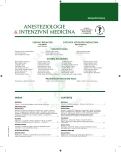-
Medical journals
- Career
Focused on pre-renal acute kidney injury – has the time come to rewrite the textbooks?
Authors: Prof. MUDr. Martin Matějovič, Ph.D.
Authors‘ workplace: Biomedicínské centrum, Lékařská fakulta v Plzni, Univerzita Karlova v Praze, Fakultní nemocnice Plzeň ; I. interní klinika, Lékařská fakulta v Plzni, Univerzita Karlova v Praze
Published in: Anest. intenziv. Med., 25, 2014, č. 1, s. 25-28
Category: Intesive Care Medicine - Special Article
Overview
Acute kidney injury (AKI) represents a wide spectrum of changes ranging from purely “functional” to completely structural kidney damage. In medical textbooks, both the fractional excretion of sodium and serum blood urea nitrogen to creatinine ration have been long considered as valuable tools to differentiate between prerrenal AKI (PRA) and established acute tubular necrosis (ATN). Recent data suggest that these traditional biomarkers used to distinguish PRA from ATN are insufficiently reliable to be clinical relevant. This article is a brief commentary on the most recent studies evaluating the diagnostic value and prognostic ability of these widely accepted blood and urine parameters in critically ill patients.
Keywords:
acute kidney Indry – fractional excretion of sodium – pre-renal azotemia
Sources
1. Matějovič, M. Desatero akutního selhání ledvin. Postgraduální medicína, 2011, 13, p. 27–34.
2. Esson, M. L., Schrier, R. W. Diagnosis and treatment of acute tubular necrosis. Ann. Intern. Med., 2002, 137, 9, p. 744–752.
3. Pons, B., Lautrette, A., Oziel, J., Dellamonica, J., Vermesh, R.,Ezingeard, E., Mariat, C., Bernardin, G., Zeni, F., Cohen, Y., Tardy, B., Souweine, B., Vincent, F., Darmon, M. Diagnostic accuracy of early urinary index changes in differentiating transient from persistent acute kidney injury in critically ill patients: multicenter cohort study. Crit. Care, 2013, 17, p. R56.
4. Rachoin, J. S., Daher, R., Moussallem, C., Milcarek, B., Hunter, K., Schorr, C., Abboud, M., Henry, P., Weisberg, L. S. The fallacy of the BUN: creatinine ratio in critically ill patients. Nephrol. Dial. Transplant., 2012, 27, 6, p. 2248–2254.
5. Fishberg, A. M. Prerenal azotemia and the pathology of renal blood flow. Bull. N. Y. Acad. Med., 1937, 13, p. 710–732.
6. Takasu, O., Gaut, J. P., Watanabe, E., To, K., Fagley, R. E., Sato, B., Jarman, S., Efimov, I. R., Janks, D. L., Srivastava, A., Bhayani, S. B., Drewry, A., Swanson, P. E., Hotchkiss, R. S. Mechanisms of cardiac and renal dysfunction in patients dying of sepsis. Am. J. Respir. Crit. Care Med., 2013, 187, p. 509–517.
7. Bagshaw, S. M., Langenberg, C., Bellomo, R. Urinary biochemistry and microscopy in septic acute renal failure: a systematic review. Am. J. Kidney Dis., 2006, 48, p. 695–705.
8. Bagshaw, S. M., Bennett, M., Devarajan, P., Bellomo, R. Urine biochemistry in septic and non-septic acute kidney injury: a prospective observational study. J. Crit. Care, 2012. doi:pii: S0883--9441(12)00334-6. 10.1016/j.jcrc.2012.10.007.
9. Claure-Del Granado, R., Macedo, E., Mehta, R. L. Urine microscopy in acute kidney injury: time for a change. Am. J. Kidney Dis., 2011, 57, p. 657–660.
10. Macedo, E., Mehta, R. L. Prerenal failure: from old concepts to new paradigms. Curr. Opin. Crit. Care, 2009, 15, p. 467–473.
11. Nickolas, T. L., Schmidt-Ott, K. M., Canetta, P. et al. Diagnostic and prognostic stratification in the emergency department using urinary biomarkers of nephron damage: a multicenter prospective cohort study. J. Am. Coll. Cardiol., 2012, 59, p. 246–255.
12. Uchino, S., Bellomo, R., Bagshaw, S. M., Goldsmith, D. Transient azotaemia is associated with a high risk of death in hospitalized patients. Nephrol. Dial. Transplant., 2010, 25, p. 1833–1839.
13. Schneider, A. G., Bellomo, R. Urinalysis and pre-renal acute kidney injury: time to move on. Crit. Care, 2013, 17, 3, p. 141.
14. Prowle, J., Bagshaw, S. M., Bellomo, R. Renal blood flow, fractional excretion of sodium and acute kidney injury: time for a new paradigm? Curr. Opin. Crit. Care, 2012, 18, 6, p. 585–592.
Labels
Anaesthesiology, Resuscitation and Inten Intensive Care Medicine
Article was published inAnaesthesiology and Intensive Care Medicine

2014 Issue 1-
All articles in this issue
- Comparison of opioid and non-opioid analgesia after caesarean section under general anaesthesia: a prospective observational study
- Clash of concurrent urgent and acute caesareansections – case report
- Myasthenia gravis and anaesthesia – a new and safer approach
- Focused on pre-renal acute kidney injury – has the time come to rewrite the textbooks?
-
Current Practice in Obstetric Anaesthesia.
Part III. Regional anaesthesia for caesarean section -
Karl Koller – the discoverer of the local anaestheticproperties of cocain, was born in Susice!
A short history of local anaesthetics
- Anaesthesiology and Intensive Care Medicine
- Journal archive
- Current issue
- Online only
- About the journal
Most read in this issue- Myasthenia gravis and anaesthesia – a new and safer approach
-
Current Practice in Obstetric Anaesthesia.
Part III. Regional anaesthesia for caesarean section -
Karl Koller – the discoverer of the local anaestheticproperties of cocain, was born in Susice!
A short history of local anaesthetics - Focused on pre-renal acute kidney injury – has the time come to rewrite the textbooks?
Login#ADS_BOTTOM_SCRIPTS#Forgotten passwordEnter the email address that you registered with. We will send you instructions on how to set a new password.
- Career

